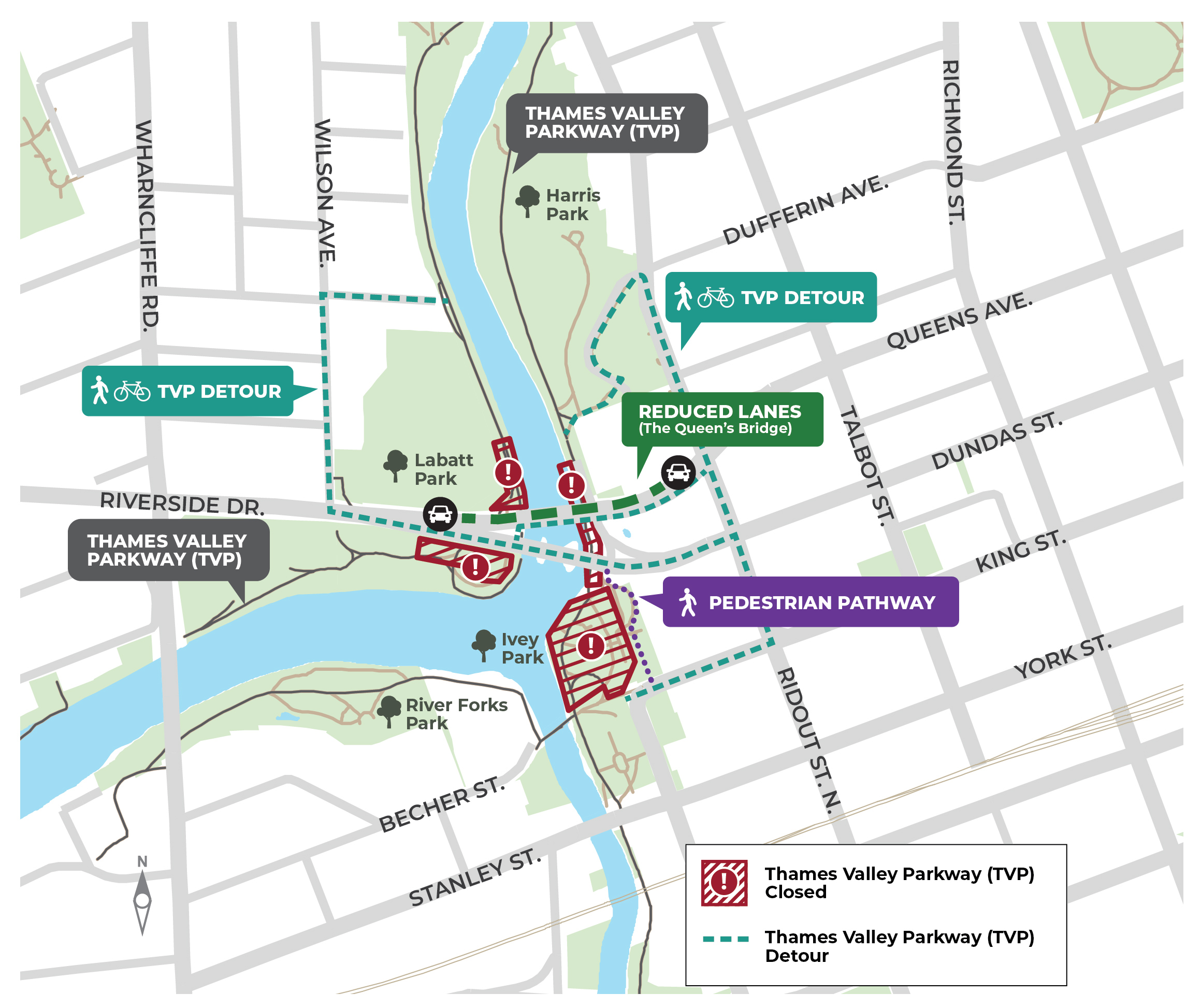The City of London will be starting a major rehabilitation of The Queen's Bridge (Queens Avenue over the Thames River) and restoration of the east shoreline of the Thames River in 2026/27 to renew aging infrastructure that has exceeded its expected lifecycle.
Public Update Meeting
The City of London is hosting a public engagement meeting to provide an update on the project and share information on construction. Because you live, work, or own property near or within the immediate project area, we want to make you aware of this meeting. If you are a property owner with business or residential tenants, please pass along this information to them.
Join us for an in-person public update meeting on Wednesday, February 25, 2026, from 5:00 to 7:00 p.m. to provide an update on the project and information on what to expect during construction.
Date: February 25, 2026
Time: 5:00 p.m. to 7:00 p.m.
Format: Drop-in
Location: Museum London, Atrium, 421 Ridout Street North, London
About the project
The Queen's Bridge and adjacent shoreline and retaining wall work on the east side of the Thames River are planned for rehabilitation.
Regular bridge inspections are completed as part of the City’s Corporate Asset Management program. The most recent inspection in 2023 rated the bridge in fair to poor condition due to age-related deck deterioration, including cracks in the surface, flaking or chipping concrete, and layers of concrete separating below the surface. To ensure a remaining service life of 50 years, a complete deck replacement is recommended.
The bridge is being widened to accommodate future Rapid Transit lanes. While a firm date has not been set for the Rapid Transit project, it is anticipated to be constructed in the next 10-year period.
The extra width will also create space for an improved path for people walking and biking on the north side of the bridge, making it easier and safer for cyclists and pedestrians to cross the bridge. The improvements are being funded and supported through an approved ICIP (Investing in Canada Infrastructure Program) project, which focuses on making bridges better for active transportation (walking, cycling, etc.).

Above: Work is planned on Queens Avenue, from Ridout Street North to Wilson Avenue, and the east shoreline of the Thames River under The Queen's Bridge and Kensington Bridge.
Proposed work details
Bridge:
The bridge rehabilitation will include replacement of the bridge deck, barrier walls, bearings, and other repairs as identified through routine inspections.
Active transportation:
A new 3m multi-use path will be built for pedestrians and cyclists along the north boulevard of Queens Avenue from Ridout Street North to the west bridge approach. The current sidewalk on the south side will be removed. In addition, a new pedestrian crossing will be installed on the west side of the bridge, spanning both Queens Avenue and Riverside Drive.
Shoreline and retaining wall work:
The structures along the east side of the Thames River that protect the riverbank from erosion (wearing away due to water flow) are old and damaged. These will be replaced to better protect the shoreline, make the area more resilient to flooding or heavy storms (climate resiliency), and preserve the natural environment along the river.
The project will also replace the retaining walls (walls that hold back soil or support the land) located under both The Queen's Bridge and Kensington Bridge. This work will connect to and continue the improvements that started in 2024 with the Harris Park Shoreline Restoration and Park Improvements project.
The construction of The Queen's Bridge rehabilitation and shoreline improvements will be coordinated with adjacent projects such as West London Dyke Reconstruction, Downtown Sewer Capacity Expansion Project, and events in the area.
Virtual public meeting
Thank you to everyone who joined us for the virtual project update meeting on Wednesday, September 10, 2025.
During the session, the project team shared details about the upcoming construction. Participants also had the opportunity to ask questions and provide feedback.
If you were unable to attend, you can view the presentation below and the meeting materials in the Documents section.
This project has been staged to minimize inconveniences and maximize access. The anticipated timeline is subject to change and may vary depending on weather and other factors.
- Stage 1: Demolition and construction of the north half of The Queen's Bridge
- Stage 2: Demolition and construction of the south half of The Queen's Bridge
Accessibility
A safe and accessible path of travel will be provided for all pedestrians through or around the construction site. If you require special accommodation (level entry, advanced notice, etc.) or have any questions about accessibility around the construction area, please contact the City Project Manager at any time during construction.
Pedestrians
Sidewalk closures and restrictions will be necessary during construction. Safe, accessible pedestrian paths will be provided to the extend possible on at least one side of the road. Signage will be installed to help guide people walking around the temporary sidewalk restrictions.
Motorists
To complete the work as efficiently as possible while maintaining westbound travel, Queens Avenue will be reduced to one westbound lane during construction.
Harris Park Gate will be closed for the duration of the project under The Queen's Bridge. No access from Riverside Drive (east of Kensington Bridge).
Vehicular, pedestrian, and cyclists will utilize Harris Park Entry (west extension of Dufferin Avenue) for access to Harris Park.
Motorists can expect delays and are encouraged to use alternate routes where possible. Access will be maintained to residences and businesses, which remain open during construction. People driving are encouraged to use navigation apps such as Waze or Google Maps to find alternative routes during construction.
Thames Valley Parkway (TVP)
TVP will be closed at The Queen's Bridge on both sides of the Thames River, with access restricted from the TVP to Queens Avenue and The Queen's Bridge. TVP detour maps and signage will be posted to assist with navigating the area.
Transit users
London Transit (LTC) bus routes and stops are not expected to be impacted during construction. Transit users are advised to visit the LTC website (londontransit.ca) for the most up-to-date information.
Other nearby work
This is another busy construction season in London, and with multiple projects taking place across the city, there is no better time to check if your commute will be impacted. To learn more about other local projects in your area, please visit london.ca/construction. You may also use the interactive map on london.ca/roadwork to find information about other current roadwork.
The Queen's Bridge, built in 1973, spans the Thames River along Queens Avenue. It is a three-span steel plate girder bridge with an exposed concrete deck, carrying two lanes of westbound traffic, a westbound bike lane, and sidewalks on both sides.
Queens Avenue is classified as a Rapid Transit Boulevard in The London Plan and supports an average of 16,000 vehicles per day, along with a high volume of pedestrians and cyclists.




